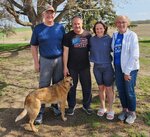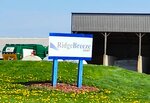TOWN OF SALEM – Imagine being inexplicably ill for years with vomiting, stomachaches, headaches. You go to doctor after doctor, but they can’t figure out what’s wrong. Your children …
This item is available in full to subscribers.
To continue reading, you will need to either log in, using the login form, below, or purchase a new subscription.
If you are a current print subscriber, you can set up a free website account and connect your subscription to it by clicking here.
Otherwise, click here to view your options for subscribing.
Please log in to continue |




TOWN OF SALEM – Imagine being inexplicably ill for years with vomiting, stomachaches, headaches. You go to doctor after doctor, but they can’t figure out what’s wrong. Your children are fixtures in the nurse’s office at school. You eat healthy foods, you’re active, you drink plenty of water, but nothing you do is helping and you get sicker every day.
This isn’t a hypothetical situation. This happened to town of Salem resident and sixth-generation farmer Samantha Bowen and her children. And when they finally learned the cause of their illness, they were shocked. It was nitrate poisoning from their well water.
“Medical records show it,” Bowen said. “That was something that I would have never, ever thought of in my life.”
Bowen said she and her kids were sick for at least five years. Her 11-year-old was in the nurse’s office daily. A doctor thought Bowen might have cyclic vomiting syndrome. They tried diet changes, different doctors, anything they could think of, until one day, someone asked offhandedly if they’d had their well tested. Once they received the results, they knew to ask their doctor to test for nitrate poisoning. Their well registered 12.9 mg/l for nitrates. Anything over 10 mg/l, according to Kevin Masarik, Center for Watershed Science and Education at UW-Stevens Point, exceeds state and federal limits for drinking water.
“We switched to bottled water and immediately got better,” Bowen said. “Water high in nitrates is really bad for infants. Both my kids had formula (made with the well water). We don’t know the long-term effects. I was vomiting several times a week, always sick to my stomach. We continued to drink the water (before the testing). It’s healthy to drink water, so we did. If someone hadn’t mentioned nitrate testing to me, we might still be there.”
A diagnosis wasn’t enough for Bowen. Buying a reverse osmosis system to make their drinking water safe wasn’t enough either. She had to know why their well was contaminated. She poured herself into research, spending three or four hours a day trying to figure out how she and her kids got sick.
Her research led her to connect with UW-River Falls Professor Emeritus of Geology, Bill Cordua, PhD, and hydrogeologist Dr. Maureen Muldoon with the Wisconsin Geological & Natural History Survey. She learned that aquifer properties determine how quickly groundwater flows, how much an aquifer can hold and how easily groundwater can become contaminated. Pierce County has “karst terrain,” which means the types of rock below the surface can naturally be dissolved by circulating groundwater. Pierce County’s bedrock is comprised of sandstone and dolomite, which are soluble. Karst landscapes have deep bedrock fractures, caves, disappearing streams, springs or sinkholes. Water can move easily through openings, carrying sediment and pollutants directly into groundwater.
Cordua told Bowen that Pierce County has a lot of sinkholes, which is why she finds it troubling that a nearby Concentrated Animal Feeding Operation (CAFO) is considering expansion. CAFOs, as defined by the state, house at least 1,000 animal units of livestock in confined situations in which feed is brought to them. One animal unit equals 1,000 pounds of live weight animal. The average Holstein, according to Pierce County Land Conservation Department Director Rod Webb, weighs about 1,400 pounds, or 1.4 animal units.
“Pierce County currently has four dairy farms with WPDES CAFO permits, and one dairy farm that has a pending WPDES CAFO permit application,” Webb said.
According to the Wisconsin Department of Health Services, CAFOs can pose many challenges, including how to handle the volume of animal waste produced by the CAFO, the associated odors, air quality, noise, changes in land use, groundwater and surface water quality, damage to local roads from increased heavy truck traffic, and impacts on nearby drinking water wells.
“It’s dangerous living next to a CAFO,” Bowen said. “Expelling tons of chemicals out of their barns can contribute to nitrate leeching and contamination. Pierce County has a lot of sinkholes, which is a concoction for disaster.”
Besides Ridge Breeze, she lives near Fetzer Farms, another CAFO located on County Road CC.
Webb said a sinkhole can be a direct conduit to the groundwater because there is little to no soil to filter runoff water before it enters the groundwater table.
“If there is manure, commercial fertilizer, pesticides or other contaminates dissolved in the runoff water, those contaminates can easily enter the water table via sinkhole,” Webb said. “USDA-NRCS 590 standard for nutrient management requires that sinkholes or other karst features be identified in the plan and nutrient application restrictions must be followed.”
Ridge Breeze
In June 2022, CEO of Breeze Dairy Group Gregg Wolf attended the Salem Plan Commission meeting to discuss their buyout of Son-Bow Farms (W2686 390th Ave., Maiden Rock). Breeze Dairy Group owns three other dairy farms in Wisconsin near Antigo, Waupaca and Fond du Lac.
The meeting minutes from June 13, 2022 indicate that Ridge Breeze was looking at expanding from 1,500 cows to 5,000. However, according to Wolf in a May 11 phone call, Ridge Breeze doesn’t have a set number planned for an expansion.
“We don’t really know at this time,” Wolf said. “We’re just looking at options. Nothing has been submitted. Not at this time.”
Webb confirmed May 11 that the Land Conservation Department has not received an application for a waste storage ordinance permit from the Breeze Dairy Group.
“Pierce County does not have any ordinances that limit the number of dairy cattle that can exist on a given site,” Webb said. “Pierce County has a waste storage ordinance (last revision was in 2011) that applies to any person who constructs a facility intended to store animal waste. This ordinance applies to any sized livestock facility. The Land Conservation Committee has been discussing possible revisions to this ordinance over the last several months and will hold a public hearing on any proposed revisions prior to voting to forward the revised ordinance to the County Board of Supervisors for action.”
Fisher said a Ridge Breeze Dairy rep came to speak to him and Bowen in April 2022 about their possible expansion to “give or take 5,000 head.” Wolf confirmed his group bought Son-Bow/Ridge Breeze in May 2022 from Jay Richardson, who contacted them when he wanted to retire.
“We thought it was a great place to farm,” Wolf said. “Eau Galle Cheese that we sell milk to in Durand was looking to make sure they have a milk supply. They were interested in keeping the dairy going.”
Bowen, along with a group of concerned neighbors/farmers who own family farms in the area, is working in conjunction with GROWW (GrassRoots Organizing Western WI). They have started a petition asking Pierce County to enact a 12-month moratorium on CAFO expansions until effective operative ordinances and bonding policies are put in place to manage current and future CAFOs in the county.
“Ordinances would be intended to manage CAFO-related waste storage, pollution including spills, township/county road, and area wells/water availability and quality,” the petition states.
About 800 people have signed the petition so far. Bowen and supporters meet frequently in her garage to strategize.
“I’m not against factory farms whatsoever,” Bowen said. “I just want to see that they get regulated as factories because they expel a lot of chemicals, gases, nitrogen and phosphorous. As of right now they are regulated the same as a 50-cow farm. I’m very worried about the expansion because people’s health is deteriorating and people don’t know.”
Bowen acknowledges that cash crop farmers and dairy CAFOs both play a part in nitrates leeching into the groundwater. But she’s upset because she feels CAFO owners aren’t taking responsibility for their part.
Wolf disagrees. Ridge Breeze sells manure to five area crop farmers, he said. They also must submit a nutrient management plan to the DNR to make sure they have enough acres on which to spread liquid manure. Webb said allowable manure spreading rates vary greatly depending on soil type, crop rotation, soil test levels, nutrient content of the manure, topography of the cropland, proximity to surface water, and presence of Karst features.
“These are all factors that affect the number of acres of cropland necessary to properly apply manure from a given number of dairy cattle,” Webb said. “A general rule of thumb that I recommend for manure applications is a minimum of 2 acres of cropland per dairy cow.”
That means at 5,000 cows, Ridge Breeze would need access to 10,000 acres. At 6,000 cows, that number jumps to 12,000 acres.
“We provide a sustainable, economic source of fertilizer,” Wolf said. “We also buy standing corn, feed and alfalfa. We offer another market to farmers for their crops.”
Other concerns
Nancy (Matzek) Weiss’s grandpa Willard Collett used to own the farm now known as Ridge Breeze. Her parents moved to the area from River Falls in 1949 so they could farm with Collett, right down the road. They bought 120 acres that contained an old house but a good barn. Weiss and husband Doug still own “the home place” and her brother lives right down the road.
“We’re worried and concerned about the fact that they’re going to have all these cattle right across the road from us,” Nancy Weiss said.
The nitrates in their well register at 13 mg/l. They’re concerned about Ridge Breeze’s proximity to the Rush River and the effect drilling for high-capacity wells could have on the groundwater supply and artesian wells in the area.
“We’re a small group of family farmers that really care about the farm,” Nancy Weiss said while choking up. “Even when my dad was dying, he said ‘don’t sell the farm.’”
Ralph Matzek was emphatic about working with Land Conservation and using contouring methods to prevent erosion. When he began renting land out in 2010, he was selective about who he rented to. He wanted farmers to share his conservation values.
“My dad could have made more money by renting to other people, but he loved the land,” Nancy Weiss said.
Within three-quarters of a mile of Ridge Breeze, there are nine high-capacity wells, plus many artesian wells, Bowen said.
“When you draw that much water out, you can deplete those wells and springs,” she said. “We’re also concerned about water going into the Rush, which is main tributary to the Mississippi. The river contains 8,000 trout per square mile.”
Ridge Breeze is also close to the Plum Creek Watershed and Nugget Lake, she added.
Nancy Weiss is concerned they won’t be able to pass the family farm to their kids and grandkids if CAFO expansions continue. Bowen is in the same boat.
“Will we even be able to hand a farm down to our children?” she posed. “Common sense says that it’s not safe to live here. It’s killing us and we have to go.”
Property values tend to go down near CAFOs, Bowen’s dad Ty Fisher said. According to Midwest Environmental Advocates, a nonprofit law center dedicating to protecting the right to healthy land, water and air for all, properties located within 3 miles of a CAFO lose up to 26% of their value. Those within one-quarter mile may lose up to 88% of their property’s value.
“Right now we can’t sell the farm because we have a contaminated well,” Fisher said.
Doug Weiss said all Pierce County residents should care about CAFO expansion because nitrates are present in high levels in many Pierce County wells. Webb confirmed the number of wells sampled in Pierce County that had nitrate test results above 10mg/l has increased from 8.8% in 1990 to 16.4% in 2022. The 1990 study included 533 wells; 47 well water samples had a nitrate level above 10mg/l. The 2018-2022 study included 721 wells, with 118 well water samples showing a nitrate level above 10mg/l.
“That’s a concern overall that should be understood,” Doug Weiss said. “Not just a concern in this township. It’s not just a local on County Road CC concern.”
Doug Weiss also said Breeze Dairy Group has had multiple DNR violations in eastern Wisconsin.
Nancy Weiss said farms self-report to the DNR, things such as spills, soil testing, nitrate testing, etc.
“Self-reporting is only as good as what the farmer is,” she said.
When asked what data shows that CAFOs are indeed safe, Wolf didn’t provide a specific example, but said his group abides by the rules given to them by the DNR.
“We make sure we have extra acres in our nutrient management plan so that we handle manure and nutrients correctly,” Wolf said. “We will take precautions. It doesn’t matter if there’s large and small farms, there’s good operators and bad operators. Having a CAFO permit means we’re more closely watched than smaller dairies. We’re under more of a microscope. We have to abide by it. I’m not going to say there aren’t bad actors out there, but I feel we do a good job.”
He’s also bothered by the petition and feels the farm is being unjustly attacked.
“I haven’t even submitted anything or done anything yet,” Wolf said. “Currently we’re just milking the cows that were there and operating the dairy as is. It’s kind of the way it is in the state of Wisconsin right now. One of the oldest industries in the state is under attack, right. Anytime anyone considers expanding or modernizing themselves, they come under attack. No one has reached out. It hurts all dairies in Pierce County. I would love to have a conversation.
I talked to one person early on. It’s one of those deals where you’d like to talk before things get this far.”
Wolf said he’s a dairyman originally from La Crosse County who would like to leave the area better than he found it. Farm managers live in Spring Valley and the surrounding areas, he said.
“We want to leave a positive image about ourselves,” Wolf said. “We want to do things right because if we do things wrong, we’ll be out of business. We have managers there that live in the area. They’re not going to do anything to jeopardize their community.”
Ridge Breeze is also looking at building a manure digester, which collects and pumps livestock manure into a closed system that captures the biogas produced when microorganisms break down organic material. The energy can be converted into heat and electricity.
What’s next?
Wolf said Ridge Breeze will work with an engineer and builder to put expansion plans together, which would be submitted to the DNR for a permit modification and the county for building and waste storage permits.
“Allowing us to implement new technologies and updates, we’re better able to protect the environment,” Wolf said. “People are scared of what they don’t know. We have a good track record. There are already other dairies in the area. I don’t know if it would be noticed after a couple of years.”
Bowen already notices the changes from having two CAFOs near her farm. Two weeks ago, she said she counted one manure tanker heading to spread manure on 600 acres near Nugget Lake every two minutes from 7 a.m. to 8 p.m. The wear and tear on the roads will fall on the taxpayers’ shoulders, she said.
Bill Hogseth, organizing director for GROWW, said when he attended a meeting in Bowen’s garage, the room was filled with families concerned about CAFO expansion.
“The industry groups are painting this as a vocal minority,” Hogseth said. “Our org is always on the side of the community. Regular people don’t have as much of a say in decisions that affect them as they should. This company could come in and change life for people not only in Salem, but in surrounding counties.
“We are pro-farmer. This is not an anti-farm moratorium. Let’s hit the pause button and have a discussion about what we want.”
The petition, which can be viewed at gro-ww.org, has about 800 signatures (online and paper) so far. Organizations in favor of the moratorium include Trout Unlimited and Lake Pepin Legacy Alliance.
The Pierce County Land Conservation Department will discuss the moratorium request at 8:30 a.m. May 23 in the Pierce County Board Room. The group is grateful the Land Conservation Committee appears to be taking their concerns seriously about what could be the largest CAFO in an 18-county area.
“We congratulate the committee for listening, taking public comment and giving their time,” Hogseth said.